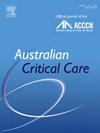重症监护病房护士对病人病情恶化的护理关注、活动和记录的经验:焦点小组研究。
IF 2.6
3区 医学
Q2 CRITICAL CARE MEDICINE
引用次数: 0
摘要
背景:尽管使用护理文件的预后预测模型具有良好的预测效果,但重症监护病房护士在患者病情恶化时的护理活动和文件记录方面的经验仍有待探讨:本研究旨在探讨重症监护病房护士在患者病情恶化时开展护理活动和记录的经验:本研究是一项描述性定性研究,采用焦点小组访谈的方式对三级医院或大学附属医院重症监护室的护士进行访谈。研究采用目的性抽样方法,共招募了 19 名在成人重症监护病房工作过至少 1 年的注册护士。共进行了五次焦点小组访谈,并通过定性内容分析对数据进行了分析:结果:重症监护室护士对患者病情恶化的体验分为四大类--感知患者病情恶化;努力核实护士的担忧;改善患者病情的护理活动;优化文件记录实践--其中包括 12 个子类别。重症监护室护士通过护理活动和文件记录认识到患者病情恶化,这两个过程相互影响。然而,由于现有的标准化表格缺乏灵活性,以及这些问题的潜在不确定性,与护士关注的问题相关的护理活动主要是口头交接,而不是记录在案:研究结果揭示了重症监护病房护士如何感知、干预和记录病情恶化患者的情况。护士的担忧可能是患者病情恶化的第一个迹象,因此对最大限度地降低患者风险至关重要。因此,系统地记录护士的担忧可能有助于改善患者的预后。本文章由计算机程序翻译,如有差异,请以英文原文为准。
Intensive care unit nurses’ experiences of nursing concerns, activities, and documentation on patient deterioration: A focus-group study
Background
Although prognosis prediction models using nursing documentation have good predictive performance, the experiences of intensive care unit nurses related to nursing activities and documentation when a patient's condition deteriorates are yet to be explored.
Objective
The aim of this study was to explore nurses' experiences of nursing activities and documentation in intensive care units when a patient's condition deteriorates.
Methods
This was a descriptive qualitative study using focus-group interviews with intensive care unit nurses in tertiary or university-affiliated hospitals. In total, 19 registered nurses with at least 1 year of clinical experience in the adult intensive care unit were recruited using a purposive sampling method. Five focus-group interviews were conducted, and the data were analysed through a qualitative content analysis.
Results
Intensive care unit nurses' experiences with patient deterioration were classified into four main categories—perceived patient deterioration; endeavours to verify nurses' concerns; nursing activities to improve a patient's condition; and optimising documentation practices—which comprised 12 subcategories. Intensive care unit nurses recognise patient deterioration through nursing activities and documentation, and the two processes influence each other. However, nursing activities related to nurses' concerns were mainly handed over verbally rather than documented due to the inflexibility of the available standardised forms and the potential uncertainty of those concerns.
Conclusions
The findings reveal how intensive care unit nurses perceive, intervene, and document the condition of a deteriorating patient. Nurses' concerns may be the first sign of a patient's deteriorating condition and are therefore crucial for minimising patient risk. Therefore, efforts to systematically document nurses' concerns may contribute to improving patient outcomes.
求助全文
通过发布文献求助,成功后即可免费获取论文全文。
去求助
来源期刊

Australian Critical Care
NURSING-NURSING
CiteScore
4.90
自引率
9.10%
发文量
148
审稿时长
>12 weeks
期刊介绍:
Australian Critical Care is the official journal of the Australian College of Critical Care Nurses (ACCCN). It is a bi-monthly peer-reviewed journal, providing clinically relevant research, reviews and articles of interest to the critical care community. Australian Critical Care publishes peer-reviewed scholarly papers that report research findings, research-based reviews, discussion papers and commentaries which are of interest to an international readership of critical care practitioners, educators, administrators and researchers. Interprofessional articles are welcomed.
 求助内容:
求助内容: 应助结果提醒方式:
应助结果提醒方式:


